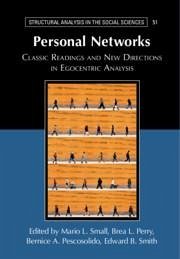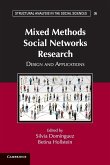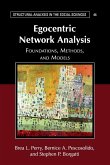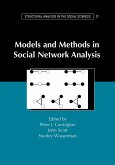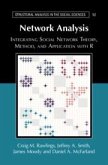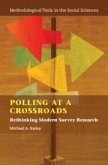Personal Networks
Classic Readings and New Directions in Egocentric Analysis
Herausgeber: Pescosolido, Bernice; Small, Mario L.; Smith, Edward B.; Perry, Brea L.
Personal Networks
Classic Readings and New Directions in Egocentric Analysis
Herausgeber: Pescosolido, Bernice; Small, Mario L.; Smith, Edward B.; Perry, Brea L.
- Broschiertes Buch
- Merkliste
- Auf die Merkliste
- Bewerten Bewerten
- Teilen
- Produkt teilen
- Produkterinnerung
- Produkterinnerung
Personal networks play a crucial role in social inequality, poverty, upward mobility, educational achievement, social support, health inequities, immigration, social movements, and many other aspects of contemporary life. This collection introduces the field to social science students and researchers in a wide range of disciplines.
Andere Kunden interessierten sich auch für
![Mixed Methods Social Networks Research Mixed Methods Social Networks Research]() Mixed Methods Social Networks Research50,99 €
Mixed Methods Social Networks Research50,99 €![Egocentric Network Analysis Egocentric Network Analysis]() Brea L. Perry (Indiana University)Egocentric Network Analysis39,99 €
Brea L. Perry (Indiana University)Egocentric Network Analysis39,99 €![Models and Methods in Social Network Analysis Models and Methods in Social Network Analysis]() Peter J. Carrington / John Scott / Stanley Wasserman (eds.)Models and Methods in Social Network Analysis48,99 €
Peter J. Carrington / John Scott / Stanley Wasserman (eds.)Models and Methods in Social Network Analysis48,99 €![In Search of Respect In Search of Respect]() Philippe Bourgois (San Francisco State University)In Search of Respect39,99 €
Philippe Bourgois (San Francisco State University)In Search of Respect39,99 €![Network Analysis Network Analysis]() Craig M. Rawlings (North Carolina Duke University)Network Analysis43,99 €
Craig M. Rawlings (North Carolina Duke University)Network Analysis43,99 €![Economic Networks Economic Networks]() Thomas J. SargentEconomic Networks43,99 €
Thomas J. SargentEconomic Networks43,99 €![Polling at a Crossroads Polling at a Crossroads]() Michael A. Bailey (Washington DC Georgetown University)Polling at a Crossroads121,99 €
Michael A. Bailey (Washington DC Georgetown University)Polling at a Crossroads121,99 €-
-
-
Personal networks play a crucial role in social inequality, poverty, upward mobility, educational achievement, social support, health inequities, immigration, social movements, and many other aspects of contemporary life. This collection introduces the field to social science students and researchers in a wide range of disciplines.
Hinweis: Dieser Artikel kann nur an eine deutsche Lieferadresse ausgeliefert werden.
Hinweis: Dieser Artikel kann nur an eine deutsche Lieferadresse ausgeliefert werden.
Produktdetails
- Produktdetails
- Structural Analysis in the Social Sciences
- Verlag: Cambridge University Press
- Seitenzahl: 770
- Erscheinungstermin: 16. September 2021
- Englisch
- Abmessung: 253mm x 178mm x 40mm
- Gewicht: 1392g
- ISBN-13: 9781108813914
- ISBN-10: 1108813917
- Artikelnr.: 61330755
- Herstellerkennzeichnung
- Libri GmbH
- Europaallee 1
- 36244 Bad Hersfeld
- gpsr@libri.de
- Structural Analysis in the Social Sciences
- Verlag: Cambridge University Press
- Seitenzahl: 770
- Erscheinungstermin: 16. September 2021
- Englisch
- Abmessung: 253mm x 178mm x 40mm
- Gewicht: 1392g
- ISBN-13: 9781108813914
- ISBN-10: 1108813917
- Artikelnr.: 61330755
- Herstellerkennzeichnung
- Libri GmbH
- Europaallee 1
- 36244 Bad Hersfeld
- gpsr@libri.de
Bernice A. Pescosolido is Distinguished Professor in the Department of Sociology at Indiana University.
Part I. Background; Introduction; Part II. Early Foundations; 1. From Simmel
'On the Significance of Numbers for Social Life: Introduction
' 'The Isolated Individual and the Dyad
' 'The Triad
' and The Web of Group Affiliations: Commentary
'Georg Simmel's Contribution to Social Network Research'; 2. From Katz and Lazarsfeld
Personal Influence: Commentary
'Influencers
Backfire Effects and the Power of the Periphery'; 3. From Mitchell
'The Concept and Use of Social Networks': Commentary
'On J. Clyde Mitchell's 'The Concept and Use of Social Networks''; 4. From Bott
'Urban Families: Conjugal Roles and Social Networks': Commentary
'Commentary on Bott's 'Family and Social Network''; 5. From Festinger
Schachter
and Back
Social Pressures in Informal Groups: Commentary
'Festinger
Schachter
and Back's Social Pressures in Informal Groups'; 6. From Bernard et al.
'The Problem of Informant Accuracy': Commentary
'Implications of Informant Accuracy Research for Ego Networks'; 7. From White
Identity and Control: Commentary
'On Parachutes and Lion-Taming'; Part III. Later Foundations; 8. From Fischer
To Dwell among Friends: Commentary
'From the Northern California Community Study
1977-78
to UCNets
2015-20'; 9. From Granovetter
'The Strength of Weak Ties': Commentary
'Strength of Weak Ties in the Labor Market: An Assessment of the State of Research'; 10. From Wellman and Wortley
'Different Strokes from Different Folks': Commentary
'A Network Pilgrim's Progress: Twenty-Six Realizations in Fifty-Five Years'; 11. From Coleman
'Social Capital in the Creation of Human Capital': Commentary
'Three Decades of Research into Social Capital: Achievements
Blind Spots
and Future Directions'; 12. From Pescosolido
'Beyond Rational Choice': Commentary
'Confronting How People Cope with Crisis: From the Social Organization Strategy Framework to the Network Episode Model to the Network Embedded Symbiome'; 13. From Feld
'The Focused Organization of Social Ties': Commentary
'Reflections On 'The Focused Organization of Social Ties' and Its Implications for Bonding and Bridging' 14. From Burt
Structural Holes: Commentary
'Structural Holes Capstone
Cautions
and Enthusiasms'; 15. From Laumann
Marsden
and Prensky
'The Boundary Specification Problem in Network Analysis': Commentary
'On the Boundary Specification Problem in Network Analysis: An Update and Extension to Personal Social Networks'; 16. From McPherson
Smith-Lovin
and Cook
'Birds of a Feather': Commentary
'The Enormous Flock of Homophily Researchers: Assessing and Promoting a Research Agenda'; 17. From Huckfeldt and Sprague
'Networks in Context': Commentary
'Individuals
Groups
and Networks: Implications for the Study and Practice of Democratic Politics'; 18. From Nan Lin
'Building a Network Theory of Social Capital' Commentary
'Social Capital: An Update'; 19. On the General Social Survey: 'Egocentric Network Studies within the General Social Survey: Measurement Methods
Substantive Findings
and Methodological Research'; Part IV. New Perspectives; 20. On Cognition: 'Network Representation Capacity: How Social Relationships are Represented in Human Mind'; 21. On Mobilization: 'How Actors Mobilize their Networks in Practice'; 22. On Trust: 'Self-Verification
Trust
and Social Capital Mobilization'; 23. On Dynamics: 'Personal Network Dynamics: Organizing Principles of Stability and Change from Complex Systems Theory'; 24. On Inequality: 'The Context of Network Inequality'; 25. On Culture: 'The Problem of Culture Flows in Weak Ties'; 26. On Migration: 'Personal Networks and Migration Trajectories'; 27. On Movements: 'The Opportunities and Challenges of Studying Social Movement Ego-Networks: Online and Offline'; 28. On Social Media: 'Studying Social Media from an Ego-Centric Perspective'.
'On the Significance of Numbers for Social Life: Introduction
' 'The Isolated Individual and the Dyad
' 'The Triad
' and The Web of Group Affiliations: Commentary
'Georg Simmel's Contribution to Social Network Research'; 2. From Katz and Lazarsfeld
Personal Influence: Commentary
'Influencers
Backfire Effects and the Power of the Periphery'; 3. From Mitchell
'The Concept and Use of Social Networks': Commentary
'On J. Clyde Mitchell's 'The Concept and Use of Social Networks''; 4. From Bott
'Urban Families: Conjugal Roles and Social Networks': Commentary
'Commentary on Bott's 'Family and Social Network''; 5. From Festinger
Schachter
and Back
Social Pressures in Informal Groups: Commentary
'Festinger
Schachter
and Back's Social Pressures in Informal Groups'; 6. From Bernard et al.
'The Problem of Informant Accuracy': Commentary
'Implications of Informant Accuracy Research for Ego Networks'; 7. From White
Identity and Control: Commentary
'On Parachutes and Lion-Taming'; Part III. Later Foundations; 8. From Fischer
To Dwell among Friends: Commentary
'From the Northern California Community Study
1977-78
to UCNets
2015-20'; 9. From Granovetter
'The Strength of Weak Ties': Commentary
'Strength of Weak Ties in the Labor Market: An Assessment of the State of Research'; 10. From Wellman and Wortley
'Different Strokes from Different Folks': Commentary
'A Network Pilgrim's Progress: Twenty-Six Realizations in Fifty-Five Years'; 11. From Coleman
'Social Capital in the Creation of Human Capital': Commentary
'Three Decades of Research into Social Capital: Achievements
Blind Spots
and Future Directions'; 12. From Pescosolido
'Beyond Rational Choice': Commentary
'Confronting How People Cope with Crisis: From the Social Organization Strategy Framework to the Network Episode Model to the Network Embedded Symbiome'; 13. From Feld
'The Focused Organization of Social Ties': Commentary
'Reflections On 'The Focused Organization of Social Ties' and Its Implications for Bonding and Bridging' 14. From Burt
Structural Holes: Commentary
'Structural Holes Capstone
Cautions
and Enthusiasms'; 15. From Laumann
Marsden
and Prensky
'The Boundary Specification Problem in Network Analysis': Commentary
'On the Boundary Specification Problem in Network Analysis: An Update and Extension to Personal Social Networks'; 16. From McPherson
Smith-Lovin
and Cook
'Birds of a Feather': Commentary
'The Enormous Flock of Homophily Researchers: Assessing and Promoting a Research Agenda'; 17. From Huckfeldt and Sprague
'Networks in Context': Commentary
'Individuals
Groups
and Networks: Implications for the Study and Practice of Democratic Politics'; 18. From Nan Lin
'Building a Network Theory of Social Capital' Commentary
'Social Capital: An Update'; 19. On the General Social Survey: 'Egocentric Network Studies within the General Social Survey: Measurement Methods
Substantive Findings
and Methodological Research'; Part IV. New Perspectives; 20. On Cognition: 'Network Representation Capacity: How Social Relationships are Represented in Human Mind'; 21. On Mobilization: 'How Actors Mobilize their Networks in Practice'; 22. On Trust: 'Self-Verification
Trust
and Social Capital Mobilization'; 23. On Dynamics: 'Personal Network Dynamics: Organizing Principles of Stability and Change from Complex Systems Theory'; 24. On Inequality: 'The Context of Network Inequality'; 25. On Culture: 'The Problem of Culture Flows in Weak Ties'; 26. On Migration: 'Personal Networks and Migration Trajectories'; 27. On Movements: 'The Opportunities and Challenges of Studying Social Movement Ego-Networks: Online and Offline'; 28. On Social Media: 'Studying Social Media from an Ego-Centric Perspective'.
Part I. Background; Introduction; Part II. Early Foundations; 1. From Simmel
'On the Significance of Numbers for Social Life: Introduction
' 'The Isolated Individual and the Dyad
' 'The Triad
' and The Web of Group Affiliations: Commentary
'Georg Simmel's Contribution to Social Network Research'; 2. From Katz and Lazarsfeld
Personal Influence: Commentary
'Influencers
Backfire Effects and the Power of the Periphery'; 3. From Mitchell
'The Concept and Use of Social Networks': Commentary
'On J. Clyde Mitchell's 'The Concept and Use of Social Networks''; 4. From Bott
'Urban Families: Conjugal Roles and Social Networks': Commentary
'Commentary on Bott's 'Family and Social Network''; 5. From Festinger
Schachter
and Back
Social Pressures in Informal Groups: Commentary
'Festinger
Schachter
and Back's Social Pressures in Informal Groups'; 6. From Bernard et al.
'The Problem of Informant Accuracy': Commentary
'Implications of Informant Accuracy Research for Ego Networks'; 7. From White
Identity and Control: Commentary
'On Parachutes and Lion-Taming'; Part III. Later Foundations; 8. From Fischer
To Dwell among Friends: Commentary
'From the Northern California Community Study
1977-78
to UCNets
2015-20'; 9. From Granovetter
'The Strength of Weak Ties': Commentary
'Strength of Weak Ties in the Labor Market: An Assessment of the State of Research'; 10. From Wellman and Wortley
'Different Strokes from Different Folks': Commentary
'A Network Pilgrim's Progress: Twenty-Six Realizations in Fifty-Five Years'; 11. From Coleman
'Social Capital in the Creation of Human Capital': Commentary
'Three Decades of Research into Social Capital: Achievements
Blind Spots
and Future Directions'; 12. From Pescosolido
'Beyond Rational Choice': Commentary
'Confronting How People Cope with Crisis: From the Social Organization Strategy Framework to the Network Episode Model to the Network Embedded Symbiome'; 13. From Feld
'The Focused Organization of Social Ties': Commentary
'Reflections On 'The Focused Organization of Social Ties' and Its Implications for Bonding and Bridging' 14. From Burt
Structural Holes: Commentary
'Structural Holes Capstone
Cautions
and Enthusiasms'; 15. From Laumann
Marsden
and Prensky
'The Boundary Specification Problem in Network Analysis': Commentary
'On the Boundary Specification Problem in Network Analysis: An Update and Extension to Personal Social Networks'; 16. From McPherson
Smith-Lovin
and Cook
'Birds of a Feather': Commentary
'The Enormous Flock of Homophily Researchers: Assessing and Promoting a Research Agenda'; 17. From Huckfeldt and Sprague
'Networks in Context': Commentary
'Individuals
Groups
and Networks: Implications for the Study and Practice of Democratic Politics'; 18. From Nan Lin
'Building a Network Theory of Social Capital' Commentary
'Social Capital: An Update'; 19. On the General Social Survey: 'Egocentric Network Studies within the General Social Survey: Measurement Methods
Substantive Findings
and Methodological Research'; Part IV. New Perspectives; 20. On Cognition: 'Network Representation Capacity: How Social Relationships are Represented in Human Mind'; 21. On Mobilization: 'How Actors Mobilize their Networks in Practice'; 22. On Trust: 'Self-Verification
Trust
and Social Capital Mobilization'; 23. On Dynamics: 'Personal Network Dynamics: Organizing Principles of Stability and Change from Complex Systems Theory'; 24. On Inequality: 'The Context of Network Inequality'; 25. On Culture: 'The Problem of Culture Flows in Weak Ties'; 26. On Migration: 'Personal Networks and Migration Trajectories'; 27. On Movements: 'The Opportunities and Challenges of Studying Social Movement Ego-Networks: Online and Offline'; 28. On Social Media: 'Studying Social Media from an Ego-Centric Perspective'.
'On the Significance of Numbers for Social Life: Introduction
' 'The Isolated Individual and the Dyad
' 'The Triad
' and The Web of Group Affiliations: Commentary
'Georg Simmel's Contribution to Social Network Research'; 2. From Katz and Lazarsfeld
Personal Influence: Commentary
'Influencers
Backfire Effects and the Power of the Periphery'; 3. From Mitchell
'The Concept and Use of Social Networks': Commentary
'On J. Clyde Mitchell's 'The Concept and Use of Social Networks''; 4. From Bott
'Urban Families: Conjugal Roles and Social Networks': Commentary
'Commentary on Bott's 'Family and Social Network''; 5. From Festinger
Schachter
and Back
Social Pressures in Informal Groups: Commentary
'Festinger
Schachter
and Back's Social Pressures in Informal Groups'; 6. From Bernard et al.
'The Problem of Informant Accuracy': Commentary
'Implications of Informant Accuracy Research for Ego Networks'; 7. From White
Identity and Control: Commentary
'On Parachutes and Lion-Taming'; Part III. Later Foundations; 8. From Fischer
To Dwell among Friends: Commentary
'From the Northern California Community Study
1977-78
to UCNets
2015-20'; 9. From Granovetter
'The Strength of Weak Ties': Commentary
'Strength of Weak Ties in the Labor Market: An Assessment of the State of Research'; 10. From Wellman and Wortley
'Different Strokes from Different Folks': Commentary
'A Network Pilgrim's Progress: Twenty-Six Realizations in Fifty-Five Years'; 11. From Coleman
'Social Capital in the Creation of Human Capital': Commentary
'Three Decades of Research into Social Capital: Achievements
Blind Spots
and Future Directions'; 12. From Pescosolido
'Beyond Rational Choice': Commentary
'Confronting How People Cope with Crisis: From the Social Organization Strategy Framework to the Network Episode Model to the Network Embedded Symbiome'; 13. From Feld
'The Focused Organization of Social Ties': Commentary
'Reflections On 'The Focused Organization of Social Ties' and Its Implications for Bonding and Bridging' 14. From Burt
Structural Holes: Commentary
'Structural Holes Capstone
Cautions
and Enthusiasms'; 15. From Laumann
Marsden
and Prensky
'The Boundary Specification Problem in Network Analysis': Commentary
'On the Boundary Specification Problem in Network Analysis: An Update and Extension to Personal Social Networks'; 16. From McPherson
Smith-Lovin
and Cook
'Birds of a Feather': Commentary
'The Enormous Flock of Homophily Researchers: Assessing and Promoting a Research Agenda'; 17. From Huckfeldt and Sprague
'Networks in Context': Commentary
'Individuals
Groups
and Networks: Implications for the Study and Practice of Democratic Politics'; 18. From Nan Lin
'Building a Network Theory of Social Capital' Commentary
'Social Capital: An Update'; 19. On the General Social Survey: 'Egocentric Network Studies within the General Social Survey: Measurement Methods
Substantive Findings
and Methodological Research'; Part IV. New Perspectives; 20. On Cognition: 'Network Representation Capacity: How Social Relationships are Represented in Human Mind'; 21. On Mobilization: 'How Actors Mobilize their Networks in Practice'; 22. On Trust: 'Self-Verification
Trust
and Social Capital Mobilization'; 23. On Dynamics: 'Personal Network Dynamics: Organizing Principles of Stability and Change from Complex Systems Theory'; 24. On Inequality: 'The Context of Network Inequality'; 25. On Culture: 'The Problem of Culture Flows in Weak Ties'; 26. On Migration: 'Personal Networks and Migration Trajectories'; 27. On Movements: 'The Opportunities and Challenges of Studying Social Movement Ego-Networks: Online and Offline'; 28. On Social Media: 'Studying Social Media from an Ego-Centric Perspective'.

